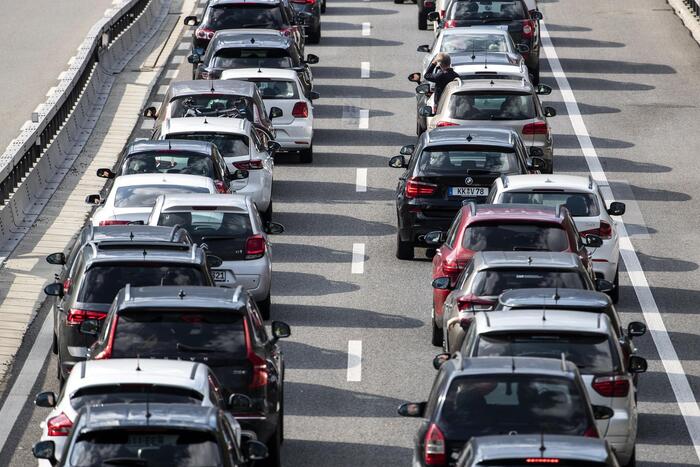BRUSSELS - The European energy ministers have
ratified by majority the regulation on the ban on petrol and diesel engines
in 2035.
Italy abstained
, according to what emerges from the final report of the vote, together with Bulgaria and Romania.
The only negative vote was cast by Poland
.
Germany, on the other hand, is favourable, after the agreement on the future use of electric fuels reached over the weekend with the European Commission.
"We will work, within the framework of the procedures for approving the legislative acts indicated by the European Commission, to have
biofuels also considered among the neutral fuels
in terms of CO2", said the
Minister of the Environment, Gilberto Pichetto
, announcing the vote of Italy's abstention from its European counterparts.
"We consider that the provision in the Commission's declaration of synthetic fuels only represents too restrictive an interpretation", he highlighted.
"Italy takes note of the Commission's written statement on Recital 11 of the new regulation on emissions from cars and vans, relating to the registration
after 2035 of vehicles with internal combustion engines
that will run on neutral fuels in terms of CO2" and, it highlighted Pichetto, "the recognition by the Commission that these vehicles can still be produced and that therefore they too will contribute to the achievement of the emission reduction objectives established by the regulation is a positive development".
Taking note of Brussels' commitment to present "proposals for legislative acts" on the
future use of e-fuels
"already in the coming months", the minister indicated that "Italy has asked for a more in-depth discussion between the Member States to make it more effective, including all available solutions" since the inclusion of synthetic fuels "does not yet allow full implementation of the principle of technological neutrality for which Italy has always fought on the basis of technical and scientific data".
"
progressive decarbonisation
of the sector".
"We are producers of biofuels and we have obtained the fact that before the" intermediate EU "verification of 2026 a discussion can be opened to prove that biofuels" are "neutral" from the point of view of CO2 emissions, Pichetto then told journalists brother.
"We believe that" the "technological neutrality" of "biofuels"
can be proven
"and" I believe that already in the coming months we will have to evaluate it with scientific evidence ", he added.
"Italy's position in the two-year period has been to say that we cannot put an end" to endothermic engines
"due to the characteristics of our Italian industrial and automotive sector"
, added Pichetto, reiterating the need to continue using "fuels that they are synthetic like e-fuels and also that they have the characteristic of balancing emissions".
"With today's final vote, the EU has taken an important step towards zero-emission mobility, the direction is clear: in 2035 new cars and vans must have zero emissions," the vice-president of the European Commission wrote in a tweet.
Frans Timmermans
, commenting on the formal ratification by EU ministers of the regulation to stop petrol and diesel cars from 2035. It is a "major contribution to climate neutrality by 2050 and a fundamental part of the Green Deal", he adds.
Polish Environment Minister Anna Moskwa spoke of "non-transparent and informal discussions in which Germany pushes for solutions that mainly benefit its market".
These "show that this has nothing to do with a just transition," she said.
"A review of the regulation banning the registration of new combustion cars is scheduled for 2026. I am confident that until then the EU will understand the absurdity of this decision and plans will be revised accordingly," she
adds
.
Well the final approval of the Council on zero-emission cars from 2035, any proposals on e-fuel "will be evaluated", commented Jan Huitema (Renew, the Netherlands), rapporteur at the European Parliament on the regulation.
"I am delighted that the agreement has finally been approved by the EU Council - says Huitema - the text of the agreement that I negotiated on behalf of the European Parliament remains unchanged and sets a clear target for 100% new cars and vans in zero emissions after 2035".
"Any future proposals regarding the use of e-fuels
will be carefully evaluated
, both on their content and on their legal basis", concludes the MEP.
In fact, the European Commission will propose in autumn 2023 a delegated act which will specify the way in which vehicles powered exclusively by fuels of synthetic origin (e-fuels) could contribute to the objectives of reducing CO2 emissions.
However, the European source who said so assured that biofuels cannot be included,
because they emit CO2, even if less than fossil fuels
, and that indirect emissions from land use must be considered.
In the event that the delegated act is rejected by the European Parliament or the EU Council, Brussels intends to re-propose its content in the mid-term review already envisaged by the regulation for 2026.
The European Commissioner for Energy Kadri Simson admitted the existence of "a discussion with the Italian minister" on biofuels.
"The issue was raised in recent days, but our intention throughout the process was not to reopen the negotiated agreement, but to give the necessary reassurances
to allow the vote to go through
".
This was stated by the EU Commissioner for Energy, Kadri Simson, commenting on Italy's requests to include biofuels in the agreement to stop heat engines from 2035. "We expect the debate with the member countries on the implementation of the agreement to continue, the Commission will act in full compliance with the legislative mandate".
Simson also reported that "if necessary, the Commission will help" governments "to implement the agreement".
"The experience we've had since the beginning of the energy crisis is that all national considerations
have to be taken into account during negotiations
," and "that's what we've done," Simson added.














